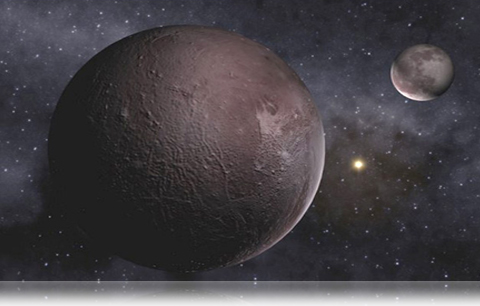
Save Pluto
See what happens when not enough people vote?
So it was just last week, when roughly 10 percent of the 2,500 voting body of the International Astronomical Union decided to demote, kick out, and dismiss our favorite oddball world, Pluto, from its classification of « planet » to that of a « dwarf planet. »
We don’t know what’s more disturbing: that our solar system’s fate is being decided by a vote with a shameful number of participants, or that « dwarf planet » is the most original name these folks could devise.
We’re not arguing that astronomers should ignore how to define properly what a planet is, an issue that’s been simmering since the days of Copernicus. Nor are we reacting against our natural inclination to put some order to our own backyard and organize how we perceive reality. Science is not about what makes us feel good, but rather how to define the observable world through experimentation and verification.
But science should not just be about cold, hard facts. How many scientific careers were launched because of a sense of wonder and awe when looking at the night sky, or the world around us? And the reality is, that what’s considered a fact can often be wrong: it took over 2,000 years to determine that the planets not only possessed elliptical (as opposed to perfectly round) orbits, but did not revolve around the Earth. With the advent of Einstein’s general theory of relativity, Newtonian physics was shown that it couldn’t hold its ground when dealing with the subatomic level. Science, like life, had to adapt to new circumstances and new explanations.
Yet there’s a certain arrogance that accompanied the vote to change Pluto’s status. Science should not be run by emotional considerations (no matter how compelling), but then again, it’s also our own emotional points of reference that color how we look the universe. After all, we call the planets and their moons with the names of Greek and Roman gods (not counting Sedna, or UB313, the furthest detected object in the solar system discovered by astronomer Michael Brown, who gave it the tacky, asinine name of « Xena »). Given how small we are in comparison to the rest of Milky Way and the universe at large, would be so much to offer a grandfather clause for Pluto, and keep the new definition of a planet as applied to other bodies discovered after Clyde Tombaugh spotted the icy world in 1930?
Children love Pluto because it’s small like them, and we love Pluto because we’ve always had a thing for the underdog. No matter how it’s neatly delineated for the sake of a small number of scientists (who must have reveled in the idea of making scores of science books obsolete with a mere vote), we say that science has left us pretty cold by shrinking our neighborhood from the now-classical nine-planet view to one that includes an asteroid (Ceres) as a dwarf planet. Romanticism should not be the guiding principle of science, but somehow, we feel we’ve lost a little bit of our humanity by kicking out Pluto.